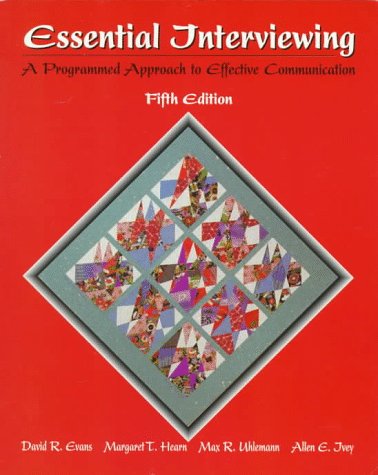Synopsis
From building rapport to facilitating change in both cooperative and resistant clients, this book guides readers step by step to mastery of each component of the complex process of effective professional/client communication. With an underlying foundation based on drawing out the stories that people have and listening to them, this book provides valuable skills for physicians, nurses, ministers, teachers, psychologists, counselors, and other professionals who are consistantly involved with other individuals.
About the Authors
David R. Evans is professor emeritus at the University of Western Ontario, where he was a member of the Clinical Psychology Program for 30 years. He has been a consultant to numerous agencies, including hospitals, adolescent facilities, addictions facilities, and police services. He holds a Ph.D. in applied psychology from the University of Toronto. He has twice been a visiting scholar at Wolfson College, Cambridge. He is a past president of the Canadian Psychological Association and the Ontario Psychological Association. He also has been a member of the Council of Representatives of the American Psychological Association and a representative to the International Union of Psychological Science. He is the author of numerous books, chapters, journal articles, tests and papers.
Margaret T. Hearn has spent over 30 years in the field of psychology. She holds a Ph.D. in counseling psychology from the University of Western Ontario. She has had extensive practical and research experience in clinical health psychology with children and adults at London Health Sciences Centre. Before retirement, her involvement was in the area of hospital management. Dr. Hearn has served as a teacher in the departments of psychology, psychiatry and pediatrics at the University of Western Ontario. She is the author of many books, chapters, articles and papers. In addition she has had extensive involvement with psychology at both a professional and regulatory level.
Max R. Uhlemann is Professor of Counseling in the Department of Educational Psychology and Leadership Studies at the University of Victoria where he is Coordinator of the Counseling Graduate Program. He received his doctorate in Counseling Psychology from Colorado State University in 1974. He has been a counselor educator since 1970. He has been a licensed psychologist since 1976. His research and teaching interests include professional and paraprofessional counseling skill training, micro-counseling skill training, interpersonal process in the counseling dyad, multi-cultural issues in counseling, and ethics and legal education and practice. He has had a private practice in counseling and clinical psychology since 1988. The focus of this practice has been on working with individuals experiencing anxiety, depression, grief, loss, and traumatic stress. He was president of the Canadian University and College Counseling Association from 1984 to 1985. He is currently concluding his nine-year editorship of the CANADIAN JOURNAL OF COUNSELING. In 1996, he received the Professional Contribution Award from the Canadian Counseling Association. He has served on ethics committees for the Canadian University and College Counseling Association, College of Psychologists of British Columbia, and Canadian Counseling Association. He is a member of the Canadian Counseling Association, Canadian Psychological Association, College of Psychologists of British Columbia, Canadian Register of Health Service Providers in Psychology, and the Western Association of Counselor Education and Supervision.
Allen E. Ivey received his Ed.D. from Harvard University. He is currently affiliated with the University of Massachusetts.
"About this title" may belong to another edition of this title.

